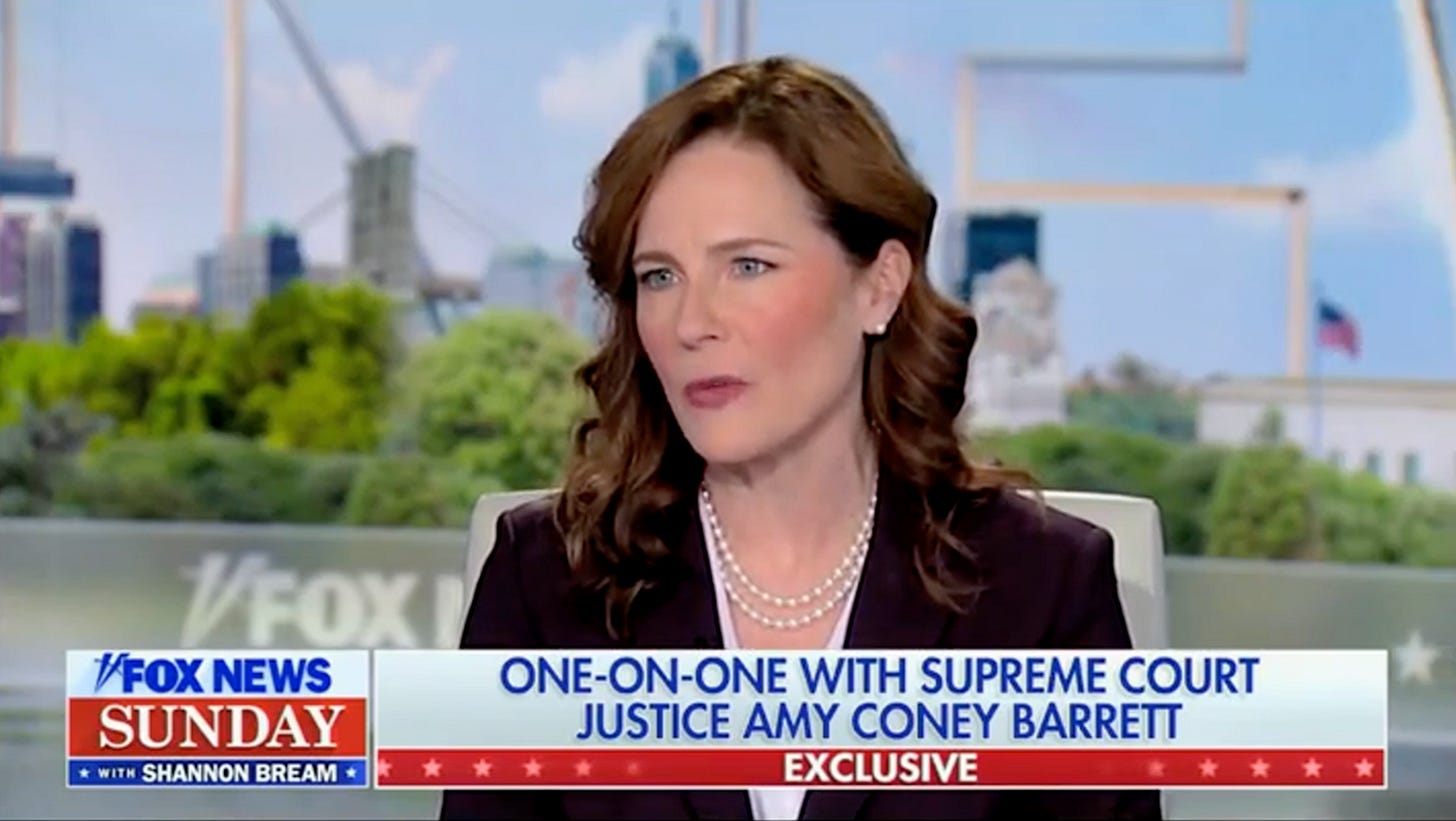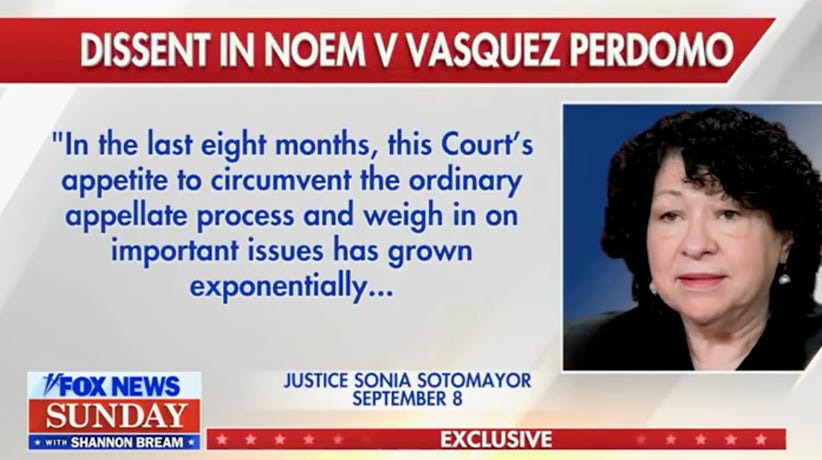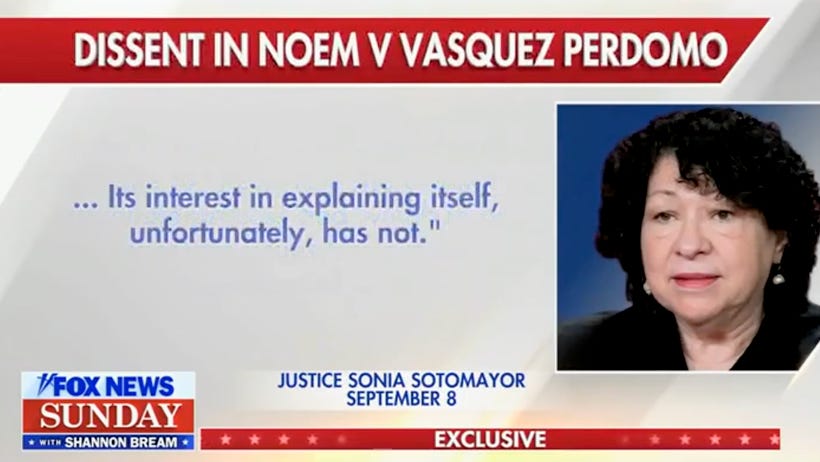Barrett turns to Fox News, rather than the docket, to explain her silence in key rulings
Justice Barrett wrote nothing in the racial profiling shadow docket ruling, but had something to say on Fox News Sunday. And, for paid subscribers: Closing my tabs.
On September 8, when the U.S. Supreme Court allowed the Trump administration to engage in racial profiling as part of its immigration raids while litigation against the administration proceeds, the court provided no reasoning for its order and, among the Republican appointees, only Justice Brett Kavanaugh wrote anything.
Justice Sonia Sotomayor, on behalf of the three Democratic appointees, authored a 21-page dissent, detailing the factual, legal, ethical, and moral reasons why the decision was a bad and unjustified one.
“We should not have to live in a country where the Government can seize anyone who looks Latino, speaks Spanish, and appears to work a low wage job,” Sotomayor wrote. “Rather than stand idly by while our constitutional freedoms are lost, I dissent.“
More than a month later, within the cozy confines of a Fox News Sunday interview with Shannon Bream, Justice Amy Coney Barrett was asked about a portion of Sotomayor’s dissent.
Barrett did not simply point to her or the court’s writings in the matter and urge Bream to move on, which, of course, made sense because there were no writings.
Instead, asked by Bream about Sotomayor’s criticism of the lack of “full transparency” on the shadow docket, Barrett responded:
These are cases that are preliminary, and so they are not cases in which the court has had full briefing and made a final judgment. … Deciding a merits case is a painstaking process. It’s slow, it takes a lot of work, and when we write an opinion, it reflects our final judgment. On the interim docket, these preliminary decisions that we make, it’s not just about the merits, whether a case is right or wrong, we can account for other factors as well, and if we wrote a long opinion, it might give the impression that we have finally resolved the issue, and in none of these cases have we finally resolved the issue.
Barrett, a law professor and appellate judge before being nominated to the Supreme Court in 2020, insisted that the "preliminary” nature of shadow docket decisions and the fact that “other factors” figure into the decision beyond the merits counsel against transparency because the justices explaining what they are doing “might give the impression“ that the shadow docket order has “finally resolved the issue.”
This is, simply put, bullshit.
Judges across the nation would be shocked to realize that explaining your work is not helpful or necessary unless you are “finally resolv[ing an] issue.” Those judges often write opinions to support temporary restraining orders and preliminary injunctions and author opinions explaining decisions on procedural motions and discovery disputes and countless other issues in advance of “finally resolv[ing] the issue.” And, lawyers know that — and the different standards that apply to and effects of those varying rulings.
If that was the only problem with what Barrett said, it might have escaped my notice. It’s bullshit, but it’s not exactly a new sort of response.
But, Barrett’s academic insistence that a shadow docket ruling needs no explanation because “in none of these cases have we finally resolved the issue,“ requires a response.
Tell that to the fired Education Department employees — and elsewhere across the federal government.
Tell that to the men sent to South Sudan and to others sent to countries where they had no prior association.
Tell that to Mary Boyle, Alexander Hoehn-Saric, and Richard Trumka Jr. — fired members of the Consumer Product Safety Commission — not to mention the Americans who believed that a bipartisan CPSC would be there, as established by Congress, to protect their kids.
Tell that to the health researchers whose funding has been canceled — sometimes midway through years-long research.
Tell that to the people protected by the Federal Trade Commission’s bipartisan stability for the past 90 years.
Tell that to the Venezuelan immigrants whose legal status in America was stripped from them.
Tell that to the people who would have benefited from the foreign aid funding that Trump unilaterally cut.
These are not some parade of horribles I am imagining for the future. These are the direct actions OK’ed by the Supreme Court shadow docket orders that Barrett told America — or, at least, the Fox News Sunday viewing audience — had not “finally resolved the issue[s].”
Barrett was, in other words, wrong on three levels on Sunday.
If she disagreed with Sotomayor, Barrett should have written something at the time — making her as accountable to the public as Sotomayor made herself accountable for her vote at the time. Second, Barrett was wrong to say that the “preliminary” nature of shadow docket orders justifies the lack of opinions. And, finally, Barrett was wrong to ignore that the shadow docket resolution often can and does resolve the issue in key ways.
Law Dork in the news
This past week, Elie Mystal from The Nation and I joined Ethan Elkind on KALW’s Your Call to discuss the new Supreme Court term.
And here is a write-up of our GW Law Supreme Court Term Preview panel discussion that I mentioned earlier.
Closing my tabs
For those who don’t what this is, it’s my effort to give a little thank you to paid subscribers. “Closing my tabs” is, literally, me looking through the stories and cases open — the tabs open — on my computer and sharing with you all some of those I was unable to cover during the week but that I nonetheless want to let you know that I have on my radar. Oftentimes, they are issues that will eventually find their way back into the newsletter as a case discussed moves forward or something new happens that provides me with a reason to cover the story more in depth.
This Monday, these are the tabs I am closing:







